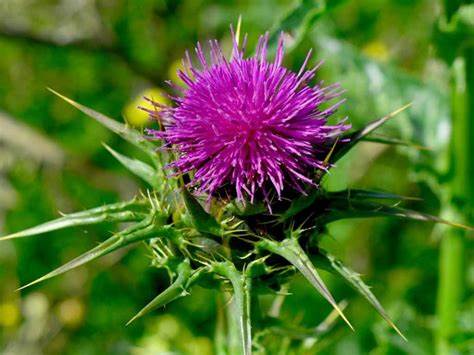Health Benefits Of
Milk Thistle
 |
| Milk thistle has been traditionally used to treat liver and gallbladder disorders |
Overview
Milk thistle, also known as Silybum marianum, is a plant that is native to the Mediterranean region and has been used for medicinal purposes for thousands of years.
The plant is characterized by its distinctive purple flowers and spiky leaves, and its seeds contain a powerful antioxidant known as silymarin.
Milk thistle has been traditionally used to treat liver and gallbladder disorders, and it is still used today as a dietary supplement to support liver health.
Silymarin has been shown to have anti-inflammatory and antioxidant properties, which may help protect the liver from damage caused by toxins and other harmful substances.
Milk thistle is available in a variety of forms, including capsules, extracts, and teas.
It is generally considered safe for most people, although some individuals may experience mild side effects such as nausea, diarrhea, and abdominal bloating.
Health Benefits Of Milk Thistle
Milk thistle has been used for thousands of years for its medicinal properties, particularly for its ability to support liver health.
Here are some potential health benefits associated with milk thistle:
Liver Support:
Milk thistle is commonly used to support
liver function and protect it from damage caused by toxins and other harmful substances.
The active ingredient in milk thistle, silymarin, has been shown to have antioxidant and anti-inflammatory properties, which may help protect liver cells from damage and support the liver's ability to regenerate.
Digestive Health:
Milk thistle may also have benefits for digestive health. It has been shown to have anti-inflammatory properties that may help reduce inflammation in the digestive tract.
Some studies have suggested that milk thistle may be helpful for people with inflammatory bowel disease.
Cholesterol Management:
Some research has suggested that milk thistle may help lower cholesterol levels by reducing the amount of cholesterol that is absorbed by the body and increasing the excretion of cholesterol through bile.
Blood Sugar Control:
Milk thistle may also have benefits for people with diabetes or other conditions that affect blood sugar levels.
Some studies have suggested that milk thistle may help lower blood sugar by increasing insulin sensitivity and reducing inflammation.
Anti-Cancer Effects:
Some preliminary research has suggested that milk thistle may have anti-cancer effects.
Studies in animals have shown that silymarin may help prevent the growth and spread of cancer cells, although more research is needed to determine whether these effects translate to humans.
Anti-Aging Properties:
Milk thistle has been shown to have anti-aging properties, thanks to its ability to reduce oxidative stress and inflammation in the body.
Some studies have suggested that milk thistle may help reduce the appearance of wrinkles and fine lines and improve skin health overall.
Immune System Support:
Milk thistle may also have benefits for the immune system. Silymarin has been shown to have immune-boosting properties that may help support the body's natural defenses against infection and disease.
Kidney Health:
Some research has suggested that milk thistle may be helpful for people with kidney disease.
Silymarin has been shown to have antioxidant and anti-inflammatory properties that may help protect the kidneys from damage caused by toxins and other harmful substances.
Hangover Relief:
Milk thistle has been traditionally used as a hangover remedy, thanks to its ability to support liver function and detoxification.
Some studies have suggested that milk thistle may be helpful for reducing hangover symptoms such as nausea, vomiting, and headache.
Skin Health:
Milk thistle may have benefits for the skin, thanks to its antioxidant and anti-inflammatory properties.
Some studies have suggested that milk thistle may help reduce skin damage caused by UV radiation, improve skin hydration, and reduce the appearance of acne.
Brain Health:
Preliminary research has suggested that milk thistle may have benefits for brain health.
Animal studies have shown that silymarin may help protect against age-related cognitive decline and may have neuroprotective effects that could be helpful for conditions such as Alzheimer's disease.
Heart Health:
Some research has suggested that milk thistle may have benefits for heart health.
Silymarin has been shown to have antioxidant properties that may help protect against oxidative stress and inflammation, which are risk factors for heart disese.
Menopausal Symptoms:
Milk thistle may also be helpful for women experiencing menopausal symptoms. Some studies have suggested that milk thistle may help reduce hot flashes and other symptoms associated with menopause.
Allergies:
Milk thistle may have benefits for people with allergies.
Some studies have suggested that silymarin may help reduce allergic reactions by reducing the release of histamine, a chemical that is involved in allergic responses.
It is important to note that while milk thistle may have potential health benefits, more research is needed to fully understand its effects on the body.
As with any supplement or medication, it is important to speak with a healthcare provider before using milk thistle, particularly if you are taking other medications or have a pre-existing medical condition.
Recommended Dosage Of Milk Thistle Supplement
 |
| The recommended dosage for milk thistle supplements is 200-400 mg per day of silymarin |
In general, the recommended dosage for milk thistle supplements is 200-400 mg per day of silymarin, the active ingredient in milk thistle.
This can be taken as a single dose or divided into two or three doses throughout the day.
Some products may recommend different dosages, so it is important to read the label carefully and follow the instructions provided.
Milk thistle supplements are generally safe for most people, but some people may experience mild side effects such as upset stomach, diarrhea, or headache.
Rarely, milk thistle can cause an allergic reaction in some individuals.
If you experience any adverse effects, it is important to stop taking the supplement and speak with a healthcare provider.
Milk thistle supplements may be taken with food or on an empty stomach, depending on the product instructions.
It is important to follow the instructions on the label carefully and avoid taking more than the recommended dosage.
Our Other Must-Read Articles:
Why Is Milk Thistle Not Used In Ayurvedic Medicines?
Milk thistle is not traditionally used in Ayurvedic medicine, as it is native to the Mediterranean region and was not introduced to India until relatively recently.
If Not Milk Thistle Then What?
Ayurvedic practitioners may use other herbs and remedies to support liver health and digestive function.
Some Ayurvedic herbs that may be used to support liver health include:
Kutki (Picrorhiza kurroa)
Bhumi amla (Phyllanthus niruri)
Guduchi (Tinospora cordifolia)
Bhringraj (Eclipta alba)
Punarnava (Boerhavia diffusa)
These herbs are traditionally used to support liver function, aid in detoxification, and promote overall health and well-being.
They may be used in various forms, such as teas, powders, capsules, or tinctures.
Here are some frequently asked questions and answers about milk thistle:
Q. What is milk thistle?
A. Milk thistle (Silybum marianum) is a plant that is native to the Mediterranean region and has been used for centuries for its medicinal properties.
Q. What are the health benefits of milk thistle?
A. Milk thistle has been shown to support liver health, aid in digestion, and may have antioxidant and anti-inflammatory properties that can support overall health and well-being.
Q. How does milk thistle work?
A. Milk thistle contains a compound called silymarin, which is thought to be responsible for many of its health benefits.
Silymarin has been shown to have antioxidant and anti-inflammatory properties and may help to protect liver cells from damage.
Q. Is milk thistle safe to take?
A. Milk thistle is generally safe for most people, but some individuals may experience mild side effects such as upset stomach, diarrhea, or headache.
Rarely, milk thistle can cause an allergic reaction in some individuals.
If you experience any adverse effects, it is important to stop taking the supplement and speak with a healthcare provider.
Q. How do I take milk thistle?
A. The appropriate dosage and form of milk thistle can vary depending on the specific product, the concentration of active ingredients, and the individual's health status and needs.
In general, the recommended dosage for milk thistle supplements is 200-400 mg per day of silymarin, which can be taken as a single dose or divided into two or three doses throughout the day.
Q. Can I take milk thistle with other medications?
A. If you are taking other medications or have a pre-existing medical condition, it is important to speak with a healthcare provider before starting milk thistle supplements to avoid potential interactions.
Q. Can milk thistle be used for other health concerns?
A. While milk thistle is commonly used for liver and digestive health, it may also have potential benefits for other health concerns such as cholesterol management and skin health.
However, it is important to speak with a healthcare provider before using milk thistle supplements for any specific health concern.
Q. What forms of milk thistle are available?
A. Milk thistle is available in various forms, including capsules, tablets, liquid extracts, and teas. It is important to choose a high-quality supplement from a reputable brand to ensure purity and potency.
Q. How long does it take for milk thistle to work?
A. The effects of milk thistle may vary depending on the individual's health status, dosage, and form of supplement.
Some people may notice improvements in liver function or digestive symptoms within a few weeks of starting milk thistle supplements, while others may take longer to see results.
Q. Can milk thistle be used during pregnancy or breastfeeding?
A. Milk thistle has not been extensively studied in pregnant or breastfeeding women, so it is recommended to avoid using it during these times unless directed by a healthcare provider.
Q. Are there any risks or side effects associated with milk thistle?
A. Milk thistle is generally considered safe for most people when taken at the recommended doses.
However, some individuals may experience mild side effects such as upset stomach, diarrhea, or headache. Rarely, milk thistle can cause an allergic reaction in some individuals.
Q. What should I look for when buying milk thistle supplements?
A. When choosing a milk thistle supplement, it is important to look for a product that is standardized to contain a specific percentage of silymarin, which is the active ingredient in milk thistle.
Look for reputable brands that use high-quality ingredients and have been independently tested for purity and potency.
Overall, milk thistle is a popular herbal supplement that has been used for centuries for its potential health benefits.
While it is generally considered safe, it is important to speak with a healthcare provider before starting milk thistle supplements to avoid potential interactions with other medications or health conditions.

Comments
Post a Comment